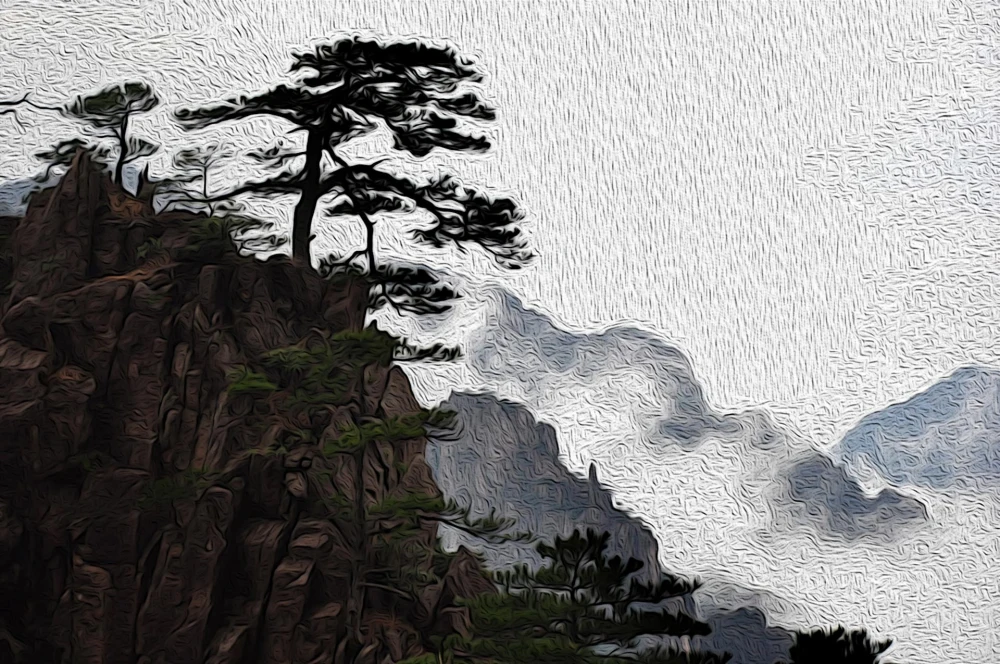In January of 756, General An Lushan and his barbarian forces captured Luoyang, the eastern Tang capital. An Lushan proclaimed himself emperor. The capital of Chang’an was threatened. China was in an uproar.
Nearby, Li Bai, from his lofty platform on Lotus Mountain, watched the advancing death and destruction.
On Lotus Mountain’s western peak
Far and wide, I spied bright stars
Bearing lotus flowers
Weakly walking for it was not too clear.
Inviting me to its cloudy stage was
Wei Shuqing, guardian angel of Huashan.
Dreamily I went with him,
Riding in the sky on the back of wild geese
Calling as they flew.
At the river, at Luoyang are
Rebel soldiers in great numbers
Blood is flowing, painting the grass along the river
Covered in jackals like tassels on a capLi Bai, Lotus Flower Peak on Huashan
西岳莲花山,迢迢见明星。
素手把芙蓉,虚步蹑太清。
霓裳曳广带,飘拂升天行。
邀我登云台,高揖卫叔卿。
恍恍与之去,驾鸿凌紫冥。
俯视洛阳川,茫茫走胡兵。
流血涂野草,豺狼尽冠缨古风 — 西岳莲花山

Lotus Mountain
莲花山, lián huāshān
Lotus Mountain range (莲花山, lián huāshān) is located between the two Tang capitals — Chang’an, the main capital in the west, and Luoyang, the older eastern capital. The range consists of five peaks, all associated with Taoism. From the eastern peak, one can watch the sunrise. And view Luoyang. For this reason, it is called Facing Sun peak. South peak, the highest peak, is also called Landing Goose Peak. Western peak, the one on which Li Bai sits, is jagged and shaped like the petals on a lotus flower, hence the name. North peak, the lowest, has the appearance of a platform and a cloudy stage. Middle peak, or Central peak, the only peak not referenced by Li Bai, is the smallest peak.
gǔ fēng qí shí jiǔ (pinyin version)
xīyuè lián huāshān ,tiáo tiáo jiàn míng xīng ,
sù shǒu bǎ fúróng , xū bù niè tàiqīng ,
ní cháng yè guǎng dài , piāo fú shēng tiānxíng ,
yāo wǒ dēng yún tái , gāo yī wèi shū qīng ,
huǎng huǎng yǔ zhī qù , jià hóng líng zǐ míng ,
fǔ shì luò yáng chuān , máng máng zǒu húbīng ,
liú xuè tú yě cǎo , chái láng jìn guān yīng .
Notes on Translation
Sometimes the title is given as Xī shàng liánhuā shān, 西 上 莲 花 山, West, Climbing Lotus Mountain. The title I have used is Xīyuè liánhuā shān, 西岳莲花山.
Xīyuè. Literally translates to “western mountains.” It is understood to refer to, Huàshān 華山, flower mountain and lotus flower mountain. I am no Chinese scholar, but I understand 山 to refer to one mountain or one peak, and 岳 to a series of peaks on a mountain. (Those familiar with the Rocky Mountain and its various peaks will understand.) The Huàshān range of mountains lies between Chang’an and Luoyang, bordering the Yellow River on the south.
Americans should think of the Grand Tetons with their different summits as a reference. Switzerland has the Jungfrau, the Eiger, and Mönch.
Tàiqīng (太清). The Grand Pure One of Taoism.
Shuqing Wei, an immortal associated with Taishang (Taishang Laojun) or a reference to Taoism’s Supreme God.
Hubing. Barbarian soldiers, the rebels under General An Lushan.
Guān yīng. A crown with tassel. Calvary helmets had black horse hair tassels.











